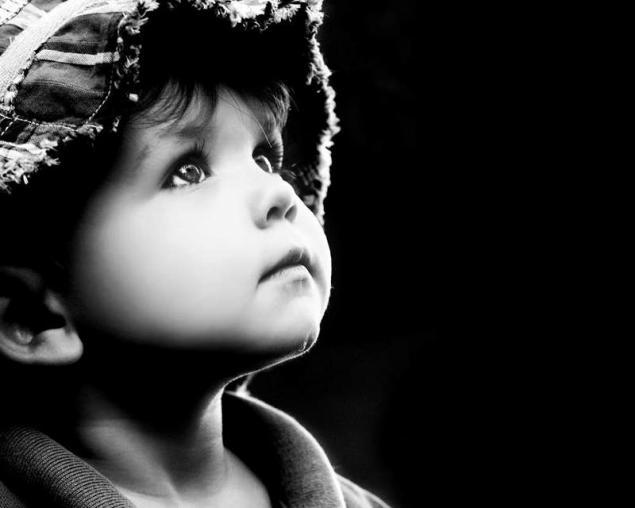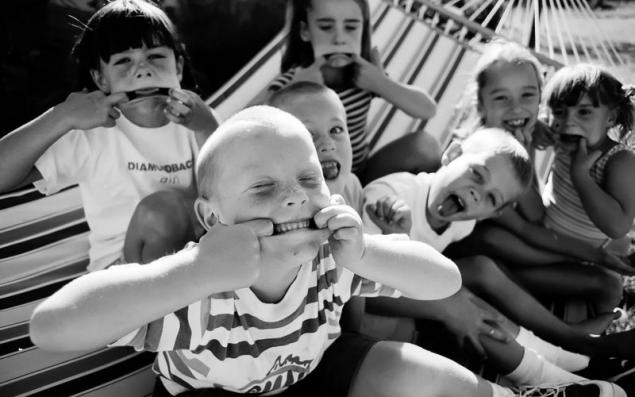759
The importance of rules and boundaries for children
No doubt that in order to live in society, we all must abide by certain rules. We don't always realize how a whole life in a society permeated by a network of big and small rules. Where to stand, how and to whom to talk, where and how long to watch... all the rules of the culture, ignorance of which can make a person if not an outcast, then at least the figure unattractive. All these rules have to learned by the child in the process of growing up.

And, although the child is equipped with excellent mechanisms of social adaptation, it faces a difficult task.
The development of rules for childhood plays a dual role
First, rules of conduct, which possess the children help them to integrate into different social situations and groups, not without attracting negative emotions of others. A child who understands that in the Church there will be no yelling in the store made roughly enough items, and the crowd is better not to push is largely protected from the resentment of others.
Second, the input rules in childhood contribute to the development of such important for the future qualities as arbitrary, volitional regulation of behavior. Kids "want" collides with reality – many divergent desires of other people that need to see and consider. Without such clashes, without understanding that your desires are not unique in the world, not grow man, able to harmoniously coexist with others.
Children non-frustration
The history of education knows a vivid example of growing a whole generation of kids that tried no to limit not just spoiling them, but for ideological reasons. America, as always rich in different innovations, became a place of interesting life experiment in the education of children.
Promoted the principle of non-frustration, that is the principle of permissive parenting. An assumption was made (Dating back even to the ideas of Freud) that people become neurotic due to the system of repression of their natural instincts, which is used in education. A child, encountering many obstacles to his will in the process of growth, prostiraetsya (frustration – a psychological term meaning a negative psychological experience that arises from inability to satisfy their desires). And if these obstacles (boundaries) to the maximum take off, we get a remarkably psychologically stable people, free and strong. Adults were willing to endure discomfort for the greater good.
The result has been bred a whole generation of so-called "nitrostilbene children," which famous scientist Konrad Lawrence called "the unfortunate generation of neurotics". These children are almost faced with restrictions at home, but they still were forced to deal with the rules of the world, however, it was too late. Encountering the unusual constraints they were experiencing a lot of stress, reacted aggressively. In addition to other troubles "nitrostilbene children" was unwelcome at many companies because its not the pressure of a part of the civilization of nature.
"... in the group without a rank order ( Lawrence is referring to the natural system of the subordination of children to adults) the child is placed in a very unnatural position. Since he can't suppress his instinct programmed the pursuit of high rank and, of course, tyranny unresisting parents, he imposed the role of the leader of the group that he's very ill. Without the support of a strong chief he feels defenseless against the outside world, always hostile, because "not frustrerande" children never love"(K. Lawrence)
Two treatment strategies with rules
So, children need rules, but how to be with the impulsiveness of children? With their mobility, the need for noisy games and constant motion? How not to suppress these valuable qualities and to provide children with an understanding of the logic of social life with its limitations? Let us consider two polar strategies for the treatment of rules.
The first strategy, conditionally, "Ecaudate", it reflects a complacent attitude to activity of children, the desire not to limit its scope, to not kill them of spontaneity and creative power. A lot of parents almost do not interfere in the activity of the children, until she is very very serious danger.

Such parents know on playgrounds. They keep Olympian calm at the time, how their children perform in different (sometimes quite scary) forms. These children can behave provocatively, too loud (not just in playgrounds) is often fighting with other kids or take their stuff. But, the parents did not intervene, leaving children to understand themselves, not wanting to restrict the child.
Such children can be on the ears in public places, play outdoor games in the crowd, talking loudly in the theater — parents prefer not to interfere, usually sit with indifferent form, showing that they are nothing to do with it.In their view, the kids are still not Mature enough to behave like an adult, then they, and does not apply adult rules and norms of behavior. The comments of others such parents answer, "Well, it's the children that you want them to do!".
The motives of such parents absolutely positive (though sometimes it seems that they are just indifferent to others): they want to raise free-spirited and open-minded people. In most cases, the true result of education is not happy, here's why:
A child still faced with the rules, since the external world is not created for the convenience of a single child. Not the parents, other people, adults and children will begin to set rules for the child's natural limitations. But to treat such rules, the child will be sharply negative, as it was not "vaccination" rules in your own family. For example, a child who is school age is used in what itself not to limit, the school will be little to understand why he should submit to the common discipline. But, does that mean he will be free from school rules? No, but it will be hard to interfere with these rules, offended and angry that somebody presses.
Parents – do those people who need respect and attention of the child. If the child is still allowed, his desire in the first place, the parents will suffer in the first place, though perhaps the effects are somewhat delayed in time. So, until the early teen years can create the illusion that the child is still small, and grow up, so he will understand, and that adults should help and treat the parents preferably respectful in words and deed. But, alas, this is not happening; if the child did not explain that we need to help, to give, and so on, then he is unlikely to make such conclusions.
Parents not wishing to expose children to the rules are divided into several categories:
1.Parents can be insensitive to the social norms of the people does not matter, but simply by temperament. It's not the people who say: "others do not care, if only I was good", and therefore teach the children. It's the people who really do not understand that breaking is fixed in the culture (often unwritten) rules.
Recently in the theater, I was able to observe the case. Was the Opera "the Tale of Tsar Saltan", there was a lot of children 6-14 years, most of them behaved quite decently, no one was particularly noisy. Next to me sat a grandmother with her grandson, 6 years old. All the first act the boy spoke, not lowering his voice. The boy spoke as if she was sitting in her room in front of the TV: consistently talked about their impressions, told about everything that it was possible to discern in the interior of the hall, the costumes of the actors and the action. Grandma never interrupted the speech of the grandson, actively supported his comments, asked questions, never offered her grandson to at least whisper. The pair did not react neither on short nor on long indignant glances. When, after the first act the lights came on and I turned on their neighbors, I saw a completely happy and even enlightened persons: a grandmother with a grandson not only hear a wonderful Opera, but rather the content communicated... Judging by their calm and peaceful mind, he did not think that hurt the interests of someone else that close to them sat the people who came to listen to music, but were forced to listen to their neighbours. Grandmother with her grandson, of course, during the intermission, made the remark, so communication during the operation had to be interrupted.
Before, when there were no cell phones, and there was a phone booth close to them sometimes accumulated queue, people were waiting to call. In crowded areas such a queue could be quite impressive. I'm standing in those queues, indignant and at the same time jealous of those people who, in spite of that hate is their turn, managed to have a leisurely quietly talking on the phone, assuming, of course, that time it was their turn, and time a telephone conversation is not regulated, they have the right to talk at your pleasure. Then I thought these people self-confident. Later, I realized that only some of these people really understood the context in which they are and the mood they engender in others.
Most "confident" people just didn't understand what was going on. In other situations they are just as insensitive to the mood of others and constantly get themselves into trouble without even realizing this is happening. They are insensitive to their own contribution to the problem simply because few comprehend their behavior.
People with reduced sensitivity to social norms, unwritten rules, respectively, raising in this way their children, usually passing them, and similar problems with others.
2.Parents are hypersensitive to the rules, often even oppressed by internal restrictions and suffering from this, also sometimes don't want to put their children in any framework. They've suffered enough that I can't walk another step without looking at it, I'd think, what the tell themselves so painfully dependent on the opinions of others that don't want to give the children such a legacy. They say something like: "my whole life was tormented by the fact that people will say, don't shout, but do not run, you're underfoot, so even though I am your child from this will save, not grow up to be neurotic".
This is a rather inadequate way to solve their problems, through the child, first, projecting onto it your internal conflict, and then it is this trying to solve the conflict (although you have to decide yourself). The children of such parents can get into a very contentious subject: the parents themselves crushed by domestic constraints cannot instill in your child adequate attitude to the rules as something positive, desirable, and ultimately making life in society more enjoyable. And such a child should have in the wide world to face the rules that had generated conflict response, as something oppressive freedom.
Interestingly, parents who themselves suffered from the fact that they instilled overly rigid attitude towards rules and has already absorbed this attitude with all his being, not being able to get rid of it yourself, often suffer from a rather tactless attitude of others.
This is natural because they believe that they have no rights, only duties, are unable to fend for themselves.
When these parents raise the child "freely" trying to impose its rules, they grow next to a man who is not prepared to reckon above all with them. That is the family they grow their immediately environment, which affects in the wider society. Now their children have all the rights in the family, "they are free", that's just parents near children somewhat deprived of their rights. Internal conflict, lack of attention to their interests, thus may have another embodiment in the outer world in relationships with grown children.

Rebellion against the limitations through the child is often immature, too categorical in nature:
One mother on the grounds that her child was overloaded with homework, actually freed his daughter from any responsibilities at home. It is easy to guess that in the end the girl grew up quite selfish, expecting that it all can be taken care of. First of all, injured the mother, who as in the past were overloaded with work around the house, constantly had to serve tomochichi.
Another mother, also wanting freedom to his child, pressed the son in terms of lifestyle and sport. It was assumed that the living nature boy will do the trick and the boy surely entice some regular physical activity. This mother is also disgusted with the thought about coercion, which were exposed in childhood: her father forced her to go on a joint run, which she hated. The calculation was wrong and also the passivity of the boy to adolescence had a weight problem and serious violations of posture.
Developments in these two stories is analogous to the motion of the pendulum: from one extreme to the other and it seems that the more extreme one extreme, the more pronounced is different.
3. A separate category is sociopathic citizens who believe that the world should bend to them, and to consciously preach the philosophy of self-centeredness and indifference to others.
These three categories of parents with great difficulty or reluctance to inculcate in children the rules, they create problems in the future.
The second strategy is to do with the rules — excessive to them the commitment, the principle of "Rules first." A considerable part of the parents is trying very hard to regulation, they think that the whole set of rules the child needs to perform almost from the cradle. These are the same parents who exhibit noticeable anxiety when their eight month old baby says "Hello-goodbye-thank you," at least in sign language. They are very excited when a rules violation occurs even in the youngest children. Such parents are willing no matter what to enforce rules, often very harsh methods, without taking into account the child's age.
How to transfer the rights of the child
In order for a child to learn to follow the rules, they should be at least charged. The humane idea that the child "he will understand" over and over again is divided about the harsh reality: children who do not restrict for whatever reasons, it is difficult transferable to others and is emotionally unstable as a result of tension in interpersonal contacts. But even if not pity of others, the rules for a child is very important, sooner or later the child who was raised without rules, face the rejection of others.
Violation of the rules one person is always provided by a lot of people that these rules are observed. For example, in order to behave in extreme driving on the road, you need to be sure that the rest will behave according to the known rules. Without this condition, Scorcher is not in hand, as the behavior of others is difficult to predict. All at once would not be able to Express yourself as you want, it would create too sharp a conflict of interest. Accordingly, the people are very angry with those who, as they say, the law does not apply, because they violate the rules at the expense of those who observe them.
It is impossible to write a set of rules for all ages. Therefore, there is a lot of questions: can the child follow the rules of behavior at the table, in what amount at what age? What can we expect from it in terms of self-control in public? Etc. it is easy to fall into the two extreme positions described above: to cancel all the rules within the logic of "amazedly" or to require the child's compliance with all rules on the principle of "rules first". Where to find the border, which will allow you to embody a healthy approach?
Families with more than one or two children to find the answer is simpler, they know better children, watch them grow, have more experience.
The right to determine the necessity of rules in General, and the degree of participation, which should provide the parents to discipline their children. So, a child 8 years old is enough to tell that anywhere can not be run and he is likely to listen to you. But the child 2 years to report it is virtually useless, he can't because of physiology and weak social inclusion to restrain their impulses. Does this mean that children 2 years of age will be required to run, not acknowledging rules, and in fact, being just not able to these rules are enough to fully perceive? Not just from parents of 2 year old children require much greater involvement for compliance with this rule.
To ensure acceptable behavior of a small child did not need the prodding and odergivaniya, and his involvement in its activity.
Mother of three Sasha brought him to the doctor, the boy is very frisky and playful and he wanted to spend time exclusively running down the corridor as quickly as possible. Mum did not want, believing that such employment more acceptable in the Park for a walk. She caught him at the end of the corridor, dragged on a chair, soot next to him and said, "Well, sit down, you're quiet!".
The boy was missing for about 10 seconds, then he started slowly sliding from his chair, messing around on the floor at every opportunity to get away from his mother, and was repeated with minor variations. The woman, exhausted by disobedience (apparently daily) sincerely tried to influence the kid and to call him to order. But she missed the most important thing – the age of the child and characteristics of his temperament. Child 3 years can not just sit quietly if he is mentally healthy.
Just put the baby next to her in the expectation that he will sit unforgivably naïve. It will not do, if only nothing significant will attract his attention.
It is understood the dad of another boy, let's call him nick. He also had to wait in line at the doctor's office, but the Pope was well aware of the peculiarities of the child's mind and prepared for a long wait in the queue. It took him a little toy railway, and, taking the turn, settled with his son on the wide windowsill at the end of the corridor. Quickly build the needed design, father and son, it seemed, had a really good time, by the way, attracting other kids to the game. After more than 40 minutes waiting in a queue Sasha's mother was exhausted to the limit, son upset. A pair of second example, by contrast, was pleased with the time and each other.
At first glance it seems that the first mother is actively transferred to the son the rules of conduct in a public place, and If dad just distracted the boy. But the result in the second case will be much better and in rules and in terms of the contact of a father and a child. Dad If IN FACT broadcast the child rule. It provided a polite (not to disturb anyone) his son's behavior.
Also come parents who are seriously preparing for the long airline flight with children. They understand that small children and would find it difficult to sit still for many hours. But they also understand that it should be done and the child will need to sit quietly for a while. How to achieve this? To pull up the baby and make him a million comments? Maybe according to the tactics of "amazedly" to pretend that this is some foreign child, and his activity cannot do anything about it? And the way he entertains himself, as you can imagine: maybe it would be to walk around the cabin, can play with paradisecasino seat passenger, who knows?
It is reasonable to take the child with something interesting, not hoping that he will sit quietly while you chat with friends or sleep.
As long as the child is too small to comply with the rules of behavior in society, parents bear the responsibility for it and enforce the rules. So in a long flight it is helpful to arm yourself calm games, ideas and, most importantly, intention to spend time with the child, hold his attention, not giving to yourself. That is how the child gradually realizes where and what you can do, and that is undesirable.
Ensuring compliance with the rules a little kid, of course, it is wise to follow their actions with explanations:
"Here the ball is not in play, let's play with words!"
"Come on we'll sit on the sidelines, not to disturb anyone while waiting for the order, and I'll draw an interesting puzzle, can you solve?"
"Here it is necessary to behave quietly, talking in sign language. Will be able to understand what I tell you?"
"While we stand in line to play loud is not necessary, it's better not to get bored, to think you a tale!"
In the examples parent:
Understanding the rules and the ability to comply with these rules without inner conflict – an important factor of social intelligence of the child. published
Author: Elizabeth Filonenko
P. S. And remember, just changing your mind — together we change the world! ©
Source: mama-papa-help.ru/blog/vospitanie-rebenka/399-pravila-dlya-rebenka-tekhnika-bezopasnosti-v-obshchestve.html

And, although the child is equipped with excellent mechanisms of social adaptation, it faces a difficult task.
The development of rules for childhood plays a dual role
First, rules of conduct, which possess the children help them to integrate into different social situations and groups, not without attracting negative emotions of others. A child who understands that in the Church there will be no yelling in the store made roughly enough items, and the crowd is better not to push is largely protected from the resentment of others.
Second, the input rules in childhood contribute to the development of such important for the future qualities as arbitrary, volitional regulation of behavior. Kids "want" collides with reality – many divergent desires of other people that need to see and consider. Without such clashes, without understanding that your desires are not unique in the world, not grow man, able to harmoniously coexist with others.
Children non-frustration
The history of education knows a vivid example of growing a whole generation of kids that tried no to limit not just spoiling them, but for ideological reasons. America, as always rich in different innovations, became a place of interesting life experiment in the education of children.
Promoted the principle of non-frustration, that is the principle of permissive parenting. An assumption was made (Dating back even to the ideas of Freud) that people become neurotic due to the system of repression of their natural instincts, which is used in education. A child, encountering many obstacles to his will in the process of growth, prostiraetsya (frustration – a psychological term meaning a negative psychological experience that arises from inability to satisfy their desires). And if these obstacles (boundaries) to the maximum take off, we get a remarkably psychologically stable people, free and strong. Adults were willing to endure discomfort for the greater good.
The result has been bred a whole generation of so-called "nitrostilbene children," which famous scientist Konrad Lawrence called "the unfortunate generation of neurotics". These children are almost faced with restrictions at home, but they still were forced to deal with the rules of the world, however, it was too late. Encountering the unusual constraints they were experiencing a lot of stress, reacted aggressively. In addition to other troubles "nitrostilbene children" was unwelcome at many companies because its not the pressure of a part of the civilization of nature.
"... in the group without a rank order ( Lawrence is referring to the natural system of the subordination of children to adults) the child is placed in a very unnatural position. Since he can't suppress his instinct programmed the pursuit of high rank and, of course, tyranny unresisting parents, he imposed the role of the leader of the group that he's very ill. Without the support of a strong chief he feels defenseless against the outside world, always hostile, because "not frustrerande" children never love"(K. Lawrence)
Two treatment strategies with rules
So, children need rules, but how to be with the impulsiveness of children? With their mobility, the need for noisy games and constant motion? How not to suppress these valuable qualities and to provide children with an understanding of the logic of social life with its limitations? Let us consider two polar strategies for the treatment of rules.
The first strategy, conditionally, "Ecaudate", it reflects a complacent attitude to activity of children, the desire not to limit its scope, to not kill them of spontaneity and creative power. A lot of parents almost do not interfere in the activity of the children, until she is very very serious danger.

Such parents know on playgrounds. They keep Olympian calm at the time, how their children perform in different (sometimes quite scary) forms. These children can behave provocatively, too loud (not just in playgrounds) is often fighting with other kids or take their stuff. But, the parents did not intervene, leaving children to understand themselves, not wanting to restrict the child.
Such children can be on the ears in public places, play outdoor games in the crowd, talking loudly in the theater — parents prefer not to interfere, usually sit with indifferent form, showing that they are nothing to do with it.In their view, the kids are still not Mature enough to behave like an adult, then they, and does not apply adult rules and norms of behavior. The comments of others such parents answer, "Well, it's the children that you want them to do!".
The motives of such parents absolutely positive (though sometimes it seems that they are just indifferent to others): they want to raise free-spirited and open-minded people. In most cases, the true result of education is not happy, here's why:
- Parents are the first conduits of social norms for the child, the family is the place where the child on the background of love absorb the basic rules of the hostel people. The introduction of the rules, for the most part unpleasant for the child, like any kind of restrictions, softened by affection to the Parent, the first sample and the installer of the rules.
- "To assimilate the cultural tradition of another person only when I love him deeply and feel his superiority"(K. Lawrence)
A child still faced with the rules, since the external world is not created for the convenience of a single child. Not the parents, other people, adults and children will begin to set rules for the child's natural limitations. But to treat such rules, the child will be sharply negative, as it was not "vaccination" rules in your own family. For example, a child who is school age is used in what itself not to limit, the school will be little to understand why he should submit to the common discipline. But, does that mean he will be free from school rules? No, but it will be hard to interfere with these rules, offended and angry that somebody presses.
Parents – do those people who need respect and attention of the child. If the child is still allowed, his desire in the first place, the parents will suffer in the first place, though perhaps the effects are somewhat delayed in time. So, until the early teen years can create the illusion that the child is still small, and grow up, so he will understand, and that adults should help and treat the parents preferably respectful in words and deed. But, alas, this is not happening; if the child did not explain that we need to help, to give, and so on, then he is unlikely to make such conclusions.
Parents not wishing to expose children to the rules are divided into several categories:
1.Parents can be insensitive to the social norms of the people does not matter, but simply by temperament. It's not the people who say: "others do not care, if only I was good", and therefore teach the children. It's the people who really do not understand that breaking is fixed in the culture (often unwritten) rules.
Recently in the theater, I was able to observe the case. Was the Opera "the Tale of Tsar Saltan", there was a lot of children 6-14 years, most of them behaved quite decently, no one was particularly noisy. Next to me sat a grandmother with her grandson, 6 years old. All the first act the boy spoke, not lowering his voice. The boy spoke as if she was sitting in her room in front of the TV: consistently talked about their impressions, told about everything that it was possible to discern in the interior of the hall, the costumes of the actors and the action. Grandma never interrupted the speech of the grandson, actively supported his comments, asked questions, never offered her grandson to at least whisper. The pair did not react neither on short nor on long indignant glances. When, after the first act the lights came on and I turned on their neighbors, I saw a completely happy and even enlightened persons: a grandmother with a grandson not only hear a wonderful Opera, but rather the content communicated... Judging by their calm and peaceful mind, he did not think that hurt the interests of someone else that close to them sat the people who came to listen to music, but were forced to listen to their neighbours. Grandmother with her grandson, of course, during the intermission, made the remark, so communication during the operation had to be interrupted.
Before, when there were no cell phones, and there was a phone booth close to them sometimes accumulated queue, people were waiting to call. In crowded areas such a queue could be quite impressive. I'm standing in those queues, indignant and at the same time jealous of those people who, in spite of that hate is their turn, managed to have a leisurely quietly talking on the phone, assuming, of course, that time it was their turn, and time a telephone conversation is not regulated, they have the right to talk at your pleasure. Then I thought these people self-confident. Later, I realized that only some of these people really understood the context in which they are and the mood they engender in others.
Most "confident" people just didn't understand what was going on. In other situations they are just as insensitive to the mood of others and constantly get themselves into trouble without even realizing this is happening. They are insensitive to their own contribution to the problem simply because few comprehend their behavior.
People with reduced sensitivity to social norms, unwritten rules, respectively, raising in this way their children, usually passing them, and similar problems with others.
2.Parents are hypersensitive to the rules, often even oppressed by internal restrictions and suffering from this, also sometimes don't want to put their children in any framework. They've suffered enough that I can't walk another step without looking at it, I'd think, what the tell themselves so painfully dependent on the opinions of others that don't want to give the children such a legacy. They say something like: "my whole life was tormented by the fact that people will say, don't shout, but do not run, you're underfoot, so even though I am your child from this will save, not grow up to be neurotic".
This is a rather inadequate way to solve their problems, through the child, first, projecting onto it your internal conflict, and then it is this trying to solve the conflict (although you have to decide yourself). The children of such parents can get into a very contentious subject: the parents themselves crushed by domestic constraints cannot instill in your child adequate attitude to the rules as something positive, desirable, and ultimately making life in society more enjoyable. And such a child should have in the wide world to face the rules that had generated conflict response, as something oppressive freedom.
Interestingly, parents who themselves suffered from the fact that they instilled overly rigid attitude towards rules and has already absorbed this attitude with all his being, not being able to get rid of it yourself, often suffer from a rather tactless attitude of others.
This is natural because they believe that they have no rights, only duties, are unable to fend for themselves.
When these parents raise the child "freely" trying to impose its rules, they grow next to a man who is not prepared to reckon above all with them. That is the family they grow their immediately environment, which affects in the wider society. Now their children have all the rights in the family, "they are free", that's just parents near children somewhat deprived of their rights. Internal conflict, lack of attention to their interests, thus may have another embodiment in the outer world in relationships with grown children.

Rebellion against the limitations through the child is often immature, too categorical in nature:
One mother on the grounds that her child was overloaded with homework, actually freed his daughter from any responsibilities at home. It is easy to guess that in the end the girl grew up quite selfish, expecting that it all can be taken care of. First of all, injured the mother, who as in the past were overloaded with work around the house, constantly had to serve tomochichi.
Another mother, also wanting freedom to his child, pressed the son in terms of lifestyle and sport. It was assumed that the living nature boy will do the trick and the boy surely entice some regular physical activity. This mother is also disgusted with the thought about coercion, which were exposed in childhood: her father forced her to go on a joint run, which she hated. The calculation was wrong and also the passivity of the boy to adolescence had a weight problem and serious violations of posture.
Developments in these two stories is analogous to the motion of the pendulum: from one extreme to the other and it seems that the more extreme one extreme, the more pronounced is different.
3. A separate category is sociopathic citizens who believe that the world should bend to them, and to consciously preach the philosophy of self-centeredness and indifference to others.
These three categories of parents with great difficulty or reluctance to inculcate in children the rules, they create problems in the future.
The second strategy is to do with the rules — excessive to them the commitment, the principle of "Rules first." A considerable part of the parents is trying very hard to regulation, they think that the whole set of rules the child needs to perform almost from the cradle. These are the same parents who exhibit noticeable anxiety when their eight month old baby says "Hello-goodbye-thank you," at least in sign language. They are very excited when a rules violation occurs even in the youngest children. Such parents are willing no matter what to enforce rules, often very harsh methods, without taking into account the child's age.
How to transfer the rights of the child
In order for a child to learn to follow the rules, they should be at least charged. The humane idea that the child "he will understand" over and over again is divided about the harsh reality: children who do not restrict for whatever reasons, it is difficult transferable to others and is emotionally unstable as a result of tension in interpersonal contacts. But even if not pity of others, the rules for a child is very important, sooner or later the child who was raised without rules, face the rejection of others.
Violation of the rules one person is always provided by a lot of people that these rules are observed. For example, in order to behave in extreme driving on the road, you need to be sure that the rest will behave according to the known rules. Without this condition, Scorcher is not in hand, as the behavior of others is difficult to predict. All at once would not be able to Express yourself as you want, it would create too sharp a conflict of interest. Accordingly, the people are very angry with those who, as they say, the law does not apply, because they violate the rules at the expense of those who observe them.
It is impossible to write a set of rules for all ages. Therefore, there is a lot of questions: can the child follow the rules of behavior at the table, in what amount at what age? What can we expect from it in terms of self-control in public? Etc. it is easy to fall into the two extreme positions described above: to cancel all the rules within the logic of "amazedly" or to require the child's compliance with all rules on the principle of "rules first". Where to find the border, which will allow you to embody a healthy approach?
Families with more than one or two children to find the answer is simpler, they know better children, watch them grow, have more experience.
The right to determine the necessity of rules in General, and the degree of participation, which should provide the parents to discipline their children. So, a child 8 years old is enough to tell that anywhere can not be run and he is likely to listen to you. But the child 2 years to report it is virtually useless, he can't because of physiology and weak social inclusion to restrain their impulses. Does this mean that children 2 years of age will be required to run, not acknowledging rules, and in fact, being just not able to these rules are enough to fully perceive? Not just from parents of 2 year old children require much greater involvement for compliance with this rule.
To ensure acceptable behavior of a small child did not need the prodding and odergivaniya, and his involvement in its activity.
Mother of three Sasha brought him to the doctor, the boy is very frisky and playful and he wanted to spend time exclusively running down the corridor as quickly as possible. Mum did not want, believing that such employment more acceptable in the Park for a walk. She caught him at the end of the corridor, dragged on a chair, soot next to him and said, "Well, sit down, you're quiet!".
The boy was missing for about 10 seconds, then he started slowly sliding from his chair, messing around on the floor at every opportunity to get away from his mother, and was repeated with minor variations. The woman, exhausted by disobedience (apparently daily) sincerely tried to influence the kid and to call him to order. But she missed the most important thing – the age of the child and characteristics of his temperament. Child 3 years can not just sit quietly if he is mentally healthy.
Just put the baby next to her in the expectation that he will sit unforgivably naïve. It will not do, if only nothing significant will attract his attention.
It is understood the dad of another boy, let's call him nick. He also had to wait in line at the doctor's office, but the Pope was well aware of the peculiarities of the child's mind and prepared for a long wait in the queue. It took him a little toy railway, and, taking the turn, settled with his son on the wide windowsill at the end of the corridor. Quickly build the needed design, father and son, it seemed, had a really good time, by the way, attracting other kids to the game. After more than 40 minutes waiting in a queue Sasha's mother was exhausted to the limit, son upset. A pair of second example, by contrast, was pleased with the time and each other.
At first glance it seems that the first mother is actively transferred to the son the rules of conduct in a public place, and If dad just distracted the boy. But the result in the second case will be much better and in rules and in terms of the contact of a father and a child. Dad If IN FACT broadcast the child rule. It provided a polite (not to disturb anyone) his son's behavior.
Also come parents who are seriously preparing for the long airline flight with children. They understand that small children and would find it difficult to sit still for many hours. But they also understand that it should be done and the child will need to sit quietly for a while. How to achieve this? To pull up the baby and make him a million comments? Maybe according to the tactics of "amazedly" to pretend that this is some foreign child, and his activity cannot do anything about it? And the way he entertains himself, as you can imagine: maybe it would be to walk around the cabin, can play with paradisecasino seat passenger, who knows?
It is reasonable to take the child with something interesting, not hoping that he will sit quietly while you chat with friends or sleep.
As long as the child is too small to comply with the rules of behavior in society, parents bear the responsibility for it and enforce the rules. So in a long flight it is helpful to arm yourself calm games, ideas and, most importantly, intention to spend time with the child, hold his attention, not giving to yourself. That is how the child gradually realizes where and what you can do, and that is undesirable.
Ensuring compliance with the rules a little kid, of course, it is wise to follow their actions with explanations:
"Here the ball is not in play, let's play with words!"
"Come on we'll sit on the sidelines, not to disturb anyone while waiting for the order, and I'll draw an interesting puzzle, can you solve?"
"Here it is necessary to behave quietly, talking in sign language. Will be able to understand what I tell you?"
"While we stand in line to play loud is not necessary, it's better not to get bored, to think you a tale!"
In the examples parent:
- voiced rule
- not expecting a small child will follow it with self-control, and understanding of features of age, offers an interesting alternative to the child.
Understanding the rules and the ability to comply with these rules without inner conflict – an important factor of social intelligence of the child. published
Author: Elizabeth Filonenko
P. S. And remember, just changing your mind — together we change the world! ©
Source: mama-papa-help.ru/blog/vospitanie-rebenka/399-pravila-dlya-rebenka-tekhnika-bezopasnosti-v-obshchestve.html























